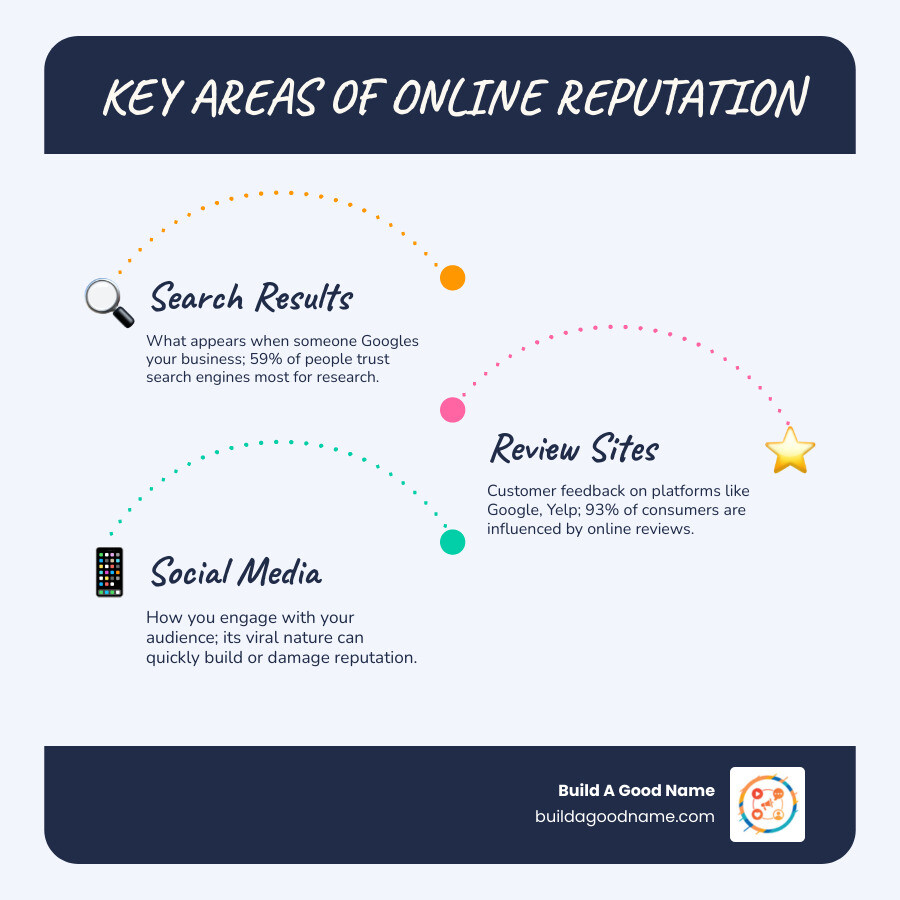Why It’s Crucial to Control Your Online Reputation
To control your online reputation means actively shaping how your business appears to the world online. This isn’t just about looking good; it’s about trust and real business growth. What people say about you online can make or break your success.
Your online reputation is built from many sources. Think of it as a blend of what customers say in reviews, what appears when someone Googles your business, and how you engage on social media.
- Monitor your online presence: Keep an eye on what’s being said about your business everywhere online.
- Create positive content: Share your story and build a strong, helpful online footprint.
- Manage reviews: Encourage happy customers to share their experiences and respond thoughtfully to all feedback.
- Use social media wisely: Engage with your audience and present your brand in the best light.
Why does this matter so much? Because 93 percent of consumers say good and bad online reviews impact their purchasing decisions. And 82 percent of consumers have been swayed to buy something just because of an online review. As one expert put it, “The viral nature of today’s information can create or destroy reputations in a micro-moment.”
Ready to take charge? This guide will show you how.

When we talk about the importance of controlling your online reputation, we’re really talking about Online Reputation Management (ORM). ORM is about taking control of the online conversation and ensuring that when people look for your business on the internet, they find accurate and positive information. It’s about creating balance, counteracting misleading trends, and allowing your business to put its best foot forward.
Consider this: 59% of people trust search engines the most when researching a business. If your online presence is lacking or, worse, filled with negative feedback, you’re missing out on a huge opportunity. The numbers speak for themselves. We know that 95 percent of customers spread the word online and offline when a business interaction goes badly, yet only 47 percent proactively share a positive experience. This imbalance means negative experiences tend to get amplified, while positive ones often need a nudge.
A strong online reputation builds customer trust, which directly impacts purchasing decisions. Customers are even willing to pay more for a service from a company with higher reviews and ratings—up to 15 percent more if they’re convinced they’ll get a better experience!
It’s not just about customers, either. Your online reputation can affect your ability to attract top talent. About 90% of employers look at potential employees’ social media profiles, and a staggering 79% have rejected a candidate based on what they found. This highlights how deeply intertwined our online and offline lives have become.
Even major corporations aren’t immune. We’ve seen how quickly a reputation crisis can unfold, with real-world financial consequences. For instance, the United Airlines incident, where a passenger was forcibly removed from a flight, generated over 1 million mentions a day on Facebook, Instagram, and Twitter. United Airlines’ stock quickly lost more than $1 billion in market value after that viral incident. This shows how quickly an online crisis can escalate and impact brand value. Reputation risks, according to 86% of risk managers and executives, could result in potentially crippling business outcomes.
The high cost of a reputation crisis
Reputation Management and Your Digital Footprint
The Real-World Consequences of a Poor Reputation
The internet has a long memory. We often say that information posted online can last forever. What might seem like a funny or harmless post today can remain online to embarrass you or your business years from now, even if you try to delete it. This is because once something is shared on the internet, it can be copied and reshared beyond your control. This permanence of our digital footprint means that a negative online presence can have significant long-term consequences.
For individuals, a damaged online reputation can impact professional opportunities. We’ve seen cases where college admissions were revoked due to inappropriate online content, and job candidates lost internship opportunities because of profanity used in public social media posts. Even being tagged in a compromising photo can be just as damaging to your reputation as if you had posted that photo yourself. Future employers and professional schools routinely scan social media for information about candidates.
For businesses, the consequences are even more direct. A poor online reputation can lead to customer churn and significant revenue loss. If 93% of consumers are influenced by online reviews, a stream of negative feedback will undoubtedly deter new customers and potentially drive away existing ones. Research indicates a measurable 9% revenue variance per reputation star. This means that every star rating on review sites translates into tangible financial impact. Neglecting your online reputation risks falling victim to misinformation and rumors, which can be difficult to combat once they spread.
Harvard admissions revoked over social media posts
Repair Your Google Reputation Before Its Too Late
Step 1: Audit and Monitor Your Digital Presence

You can’t control your online reputation if you don’t know what’s out there in the first place. Think of this step as taking inventory of your digital life. It might feel a bit like detective work, but it’s actually one of the most important things you can do for your business.
Start with the obvious: Google yourself. Yes, really! Search for your business name, your own name, and any key people in your company. Don’t stop at the first page of results either. Dig deeper—sometimes the most surprising content shows up on page three or four. What story do these results tell about your business?
The truth is, people trust search engines more than almost anything else when they’re researching a business. So what they find when they search for you matters tremendously. You want to make sure you’re telling your own story, not letting random internet content speak for you.
Your audit should go beyond basic Google searches though. Review sites like Google Reviews, Yelp, and industry-specific platforms are goldmines of customer sentiment. Check them all, even the ones you forgot existed. Social media is another crucial area—look for mentions, tags, and comments across every platform where your business might appear.
Don’t forget about forums and blogs where people might be discussing your industry or your business specifically. Sometimes the most honest conversations happen in these less obvious places. For business owners, it’s also worth checking “people search” sites that aggregate public information, though you can often opt out of these to protect your privacy.
Online Presence and Smart Reputation Management Practices
Creating Your Monitoring System
Once you know what’s currently out there, you need a system to stay on top of new content as it appears. The internet never sleeps, and neither should your reputation monitoring.
Google Alerts are your best friend here. Set them up for your business name, common misspellings, key products, and even the names of your main team members. Every time something new appears online with these terms, you’ll get an email alert. It’s like having a personal assistant who never misses anything.
Make checking review platforms a regular habit, not just something you do when you remember. New reviews can appear anytime, and responding quickly shows you care about your customers. 69% of consumers say reviews older than three months don’t count, so staying current is crucial.
Social media monitoring goes beyond just checking your own accounts. Most platforms will notify you when you’re mentioned or tagged, but consider tracking keywords related to your brand even when you’re not directly mentioned. Sometimes the most valuable conversations happen when people don’t tag you directly.
Here’s a pro tip: use incognito mode when searching for your business. Your regular browser remembers your search history and shows you personalized results. Incognito mode gives you a cleaner picture of what strangers actually see when they search for you.
Finally, have a conversation with your team about online responsibility. Ask your friends and employees to be considerate of how their online behavior might reflect on your business. A single thoughtless post from someone connected to your company can create unnecessary headaches.
Setting up this monitoring system might feel like extra work at first, but it’s actually your early warning system. The sooner you know about potential reputation issues, the faster you can address them.
Google Online Reputation Management
Step 2: Proactively Build a Positive Online Fortress
Monitoring is essential, but it’s only half the battle. To truly control your online reputation, we must proactively build a positive online fortress around your business. This means creating and promoting content that highlights your strengths, values, and positive customer experiences. Think of it as strategically planning new, positive content to minimize and push down any older, less favorable information.
One of the most effective ways to do this is through consistent content creation. A well-maintained blog, for example, naturally attracts a lot of links and external references, providing fresh, relevant content that search algorithms love. We can share valuable insights, industry news, company updates, and success stories. This positions your business as an expert in its field, building credibility and trust.
We also encourage becoming an expert source for media queries through services like HARO (Help A Reporter Out). This can lead to earned media placements, which are incredibly powerful for pushing down negative search results. As one expert noted, “The best way to push down the old content is through earned media placements.”
And, of course, a cornerstone of building a positive online fortress is actively generating positive reviews. We know 87% of consumers read online reviews for local businesses. Happy customers are your best advocates, but they often need a nudge. We should actively ask for Google, Yelp, and other platform reviews. Our experience shows that businesses using review management platforms have seen a 510% increase in review volume and an 88% positive review share, leading to over 1,000,000 5-star reviews!
Generate More Google Reviews
Become an expert source with HARO
Use social media to control your online reputation
Social media plays a critical role in shaping your online reputation. It’s where customers engage with brands, share experiences, and form perceptions. To effectively control your online reputation through social media, we need a strategic approach:
- Profile Optimization: Ensure all your social media profiles are fully completed, using your full business name or brand name. Include high-quality photos, detailed bios, and links back to your controlled web properties. This provides a consistent and professional image.
- Consistent Branding: Maintain a cohesive brand voice, visual style, and messaging across all social platforms. This reinforces your identity and makes your business easily recognizable and trustworthy.
- Value-Driven Content: Don’t just advertise. Share content that provides value to your audience—be it educational, entertaining, or inspiring. Think carefully about whether your post sends the message you want the world to hear. We advise against posting anything that could be misinterpreted or come back to haunt you, like a “spring break beer pong victory” that might not impress a hiring manager.
- Audience Engagement: Social media is a two-way street. Respond promptly to comments, messages, and mentions. Engage with your audience, answer their questions, and participate in relevant conversations. This shows you’re listening and care about your community.
- Choosing the Right Platforms: You don’t need to be everywhere. Focus your efforts on the platforms where your target audience is most active and where you can effectively showcase your business. For professional services, LinkedIn is a must, but for local businesses targeting consumers, Facebook, Instagram, and TikTok might be more impactful.
- Privacy Settings: For personal profiles of key personnel, ensure privacy settings are robust. While your business profile is public, individuals should manage their personal digital footprint carefully. Encourage employees to be mindful of what they post, as it can reflect on the company.
By actively cultivating a strong and positive presence on social media, we can steer the narrative, engage with our audience on a human level, and ensure that our online image aligns with our business values.
Reputation Management to Strengthen Your Online Image
Step 3: Master the Art of Responding to Negative Feedback
Even with the most dedicated efforts to build a stellar online presence, negative feedback is simply a part of doing business. It’s not the presence of a less-than-perfect review that defines your reputation, but rather how you handle it. Mastering the art of responding to negative feedback is absolutely crucial if you want to effectively control your online reputation. Think of it as a chance to show your true colors – and your commitment to your customers – to the entire world.
When a negative comment or review pops up, our first instinct might be to get defensive or even ignore it. But that’s precisely the opposite of what we should do! Instead, accept it as an opportunity. A thoughtful, well-handled response can turn a disgruntled customer into a loyal advocate, and it shows potential new customers that you genuinely care.
So, how do we master this art? It starts with timeliness. We always recommend responding to reviews, especially the negative ones, within 48 hours. A quick reply signals that you’re attentive, you’re listening, and you take customer concerns seriously.
Next, lead with empathy. It’s vital to acknowledge the customer’s frustration and genuinely apologize for their negative experience, even if you feel the complaint might be unwarranted. Phrases like, “We’re truly sorry you had this experience,” or “We understand your frustration,” can go a long way in de-escalating the situation and showing you care.
Always maintain professionalism. Your response isn’t just for the person who left the review; it’s visible to countless potential customers. Avoid getting defensive or engaging in online arguments. Your measured, respectful tone will reflect positively on your business, regardless of the original complaint. If the issue is complex or requires a detailed discussion, offer to take the conversation offline. Provide a direct email or phone number so you can resolve the matter privately. This prevents a public back-and-forth and allows for a more personal, custom resolution.
A well-managed negative interaction can be a powerful way of turning negatives into positives. It demonstrates your commitment to customer satisfaction and problem-solving. We’ve seen countless businesses transform critics into champions simply by responding constructively and openly.
Respond to Google Reviews
A framework to control your online reputation during a crisis
Sometimes, negative feedback can escalate beyond a single review, growing into a full-blown crisis. In these high-stakes situations, having a clear, calm framework for your response is absolutely paramount to control your online reputation. Our approach is built on transparency, promptness, and a genuine commitment to finding a resolution.
Here’s a framework we recommend to steer those challenging moments:
- Acknowledge and Apologize: The very first step is always to acknowledge the situation and apologize sincerely for any negative experience or impact. Even if you believe your business isn’t entirely at fault, acknowledging the customer’s feelings is crucial. As Megan Sweeney from the American Staffing Association advises, “If something’s wrong with a product, acknowledge it, apologize and explain what you’re doing to correct the issue and ensure it doesn’t happen again.”
- Explain the Solution (or the Plan): Clearly communicate what steps you are taking to address the issue. If a solution isn’t immediately available, explain your plan of action and what customers can expect. This demonstrates accountability and a commitment to improvement, building trust even in difficult times.
- Don’t Get Defensive: This is perhaps the hardest part, but it’s critical. It’s natural to want to defend your business, but online, defensiveness often backfires and can make the situation worse. Focus on the facts and the solution, rather than disputing every point of the complaint. Our goal is to de-escalate, not to win an argument.
- Follow Up Privately: For individual complaints, always offer to follow up directly and privately. This allows for a more detailed discussion and resolution without further public exposure, protecting both your business and the individual’s privacy.
- Learn from Feedback: Every piece of negative feedback, especially during a crisis, is a valuable opportunity to learn and improve. Use the insights gained to refine your products, services, or processes. Our AI-powered review management software, for example, can analyze feedback to help you identify recurring issues and make operational improvements, turning challenges into growth opportunities.
We firmly believe that the worst thing you can do is to leave your reputation up to the whims of the internet. By having a prepared, empathetic, and professional response strategy in place, we can steer even the toughest online storms and protect the good name you’ve worked so hard to build.
Frequently Asked Questions about Online Reputation
We often get asked about the nuances of online reputation management. It’s a big topic, and it’s natural to have questions about how it all works. Here are some of the most common ones we hear:
How is online reputation management (ORM) different from SEO?
This is a great question, as ORM and SEO often work together, but they have different jobs! Think of it this way: both Online Reputation Management (ORM) and Search Engine Optimization (SEO) help you show up in search results. However, their main goals are quite distinct.
SEO’s Goal: SEO primarily focuses on getting your specific website to rank high for certain keywords. It’s all about driving traffic to one particular page by making it super visible. If you sell “organic dog food,” SEO wants your organic dog food page to be number one on Google.
ORM’s Goal: ORM, on the other hand, wants to control the entire collection of websites that appear when someone searches for your name or brand. It’s about filling that first page of search results with positive, accurate, and relevant information. This helps push down anything negative or misleading. ORM’s purpose is to shape the overall perception and ensure balance across all the results people see about you.
So, while both use similar tools like great content and smart keywords, their ultimate aims are different. SEO wants to rank a site; ORM wants to manage the entire story that appears for your brand or name. We use SEO tactics within ORM, of course, to make sure your positive content shines and outranks the negative.
Can I permanently remove negative content from the internet?
This is a question we hear a lot, and we understand why you’d want to! The simple answer is: it’s very difficult, and often, no. As we’ve discussed, once something is shared online, it can get copied and reshared beyond your control. The internet truly has a long memory, and information posted there can effectively last forever.
You can sometimes remove content you directly control, like an old social media post you made yourself. You can also ask platforms to remove content if it clearly breaks their rules (like hate speech or copyright infringement). But for content created by other people – especially news articles, reviews, or forum discussions – getting it completely removed is very rare. Even if it’s legally defamatory, it can be a long and tough process.
Our main strategy, and the common approach in ORM, is often about suppression rather than outright removal. This means we focus on creating and promoting so much new, positive, and relevant content that any negative results get pushed way down in search rankings. They essentially become invisible to most people. Think of it like burying the negative under a mountain of good stuff! Our tools at Build A Good Name can help you generate this positive content and ensure it’s optimized to outrank older, less favorable information.
How long does it take to repair a damaged online reputation?
The timeline for repairing a damaged online reputation really varies a lot. It depends on how bad the damage is, how much negative content is out there, how consistently you work at it, and even your industry.
- Minor Issues: If you’re dealing with just a few negative reviews or isolated incidents, we often see big improvements in a few weeks to a few months. This involves a quick response, getting more positive reviews, and consistently creating good content. For example, we’ve seen a property manager significantly raise their Reputation Score in just a few months by systematically managing their reviews.
- Significant Crises: For businesses facing a major crisis, widespread negative media, or a lot of deeply rooted negative content, it can take a year or even more of dedicated, strategic work to overcome. This calls for a full ORM strategy, including crisis communication, long-term content creation, and persistent engagement.
Repairing an online reputation isn’t a one-time fix. It’s an ongoing journey that needs continuous effort and attention. The good news is that with a structured plan and the right tools, improvements are always possible. And the return on investment for a better reputation is truly substantial!
Take Charge of Your Digital Narrative
You’ve made it this far, which means you understand something crucial: in today’s digital world, your reputation isn’t just what people say about you around the water cooler anymore. It lives and breathes online, where 93% of consumers make their purchasing decisions based on what they find.
The internet never forgets, and that can feel overwhelming. But here’s what we want you to remember—you’re not powerless in this story. You can absolutely control your online reputation and shape how the world sees your business.
Think of everything we’ve covered as your roadmap to digital success. First, you need to know what’s out there. Regular audits and monitoring through Google Alerts, review platforms, and social media give you the full picture. You can’t manage what you don’t measure, right?
Next comes the fun part—building your positive fortress. This means creating valuable content, positioning yourself as the go-to expert in your field, and consistently encouraging those happy customers to share their experiences. Positive reviews don’t just happen on their own. They need a gentle nudge from you.
Finally, when challenges arise—and they will—you’ll be ready. Responding to feedback with empathy, professionalism, and genuine care can actually strengthen your reputation. We’ve seen businesses turn their harshest critics into loyal advocates simply by handling situations with grace.
This isn’t a “set it and forget it” kind of thing. Managing your online reputation requires continuous effort, but the payoff is enormous. Being proactive rather than reactive means you’re always one step ahead, building trust before problems arise.
Here’s the reality: the power of reviews in today’s marketplace is undeniable. When customers trust what they see online about your business, they’re willing to choose you over competitors and even pay more for your services. That’s the kind of competitive advantage every business dreams of.
At Build A Good Name, we’ve built our AI-powered tools specifically for busy business owners who understand the importance of reputation management but need help making it manageable. Our software automates the heavy lifting—from collecting reviews to crafting personalized responses—so you can focus on what you do best: running your business.
Your digital narrative is too important to leave to chance. Every day you wait is another day someone else might be shaping the story for you. Take charge today, and let’s help you build the reputation your business truly deserves.
Mastering Reputation Management in Business Today




